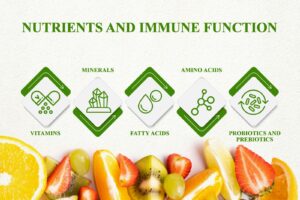Immunomodulation involves the regulation of the immune system, which can be either upregulated or downregulated. The immune response is a complex interplay of cells, cytokines, and antibodies, influenced by many factors, including nutrients. Certain foods and their components have been found to have immunomodulatory effects, which can be beneficial in preventing and managing diseases.
Nutrients and Immune Function:

Several nutrients are known to play critical roles in the functioning of the immune system:
Vitamins: Vitamins A, C, D, and E are essential for both innate and adaptive immune responses. For instance, vitamin D has been linked to a reduced risk of infections and improved immune defense. Vitamin A is crucial for maintaining the structural and functional integrity of mucosal cells in the innate response, while vitamins C and E act as antioxidants that protect immune cells from oxidative stress.
Minerals: Zinc, selenium, iron, and copper are crucial for various immune functions, such as the production of antibodies and the proliferation of immune cells. Zinc is particularly important for the normal development and function of cells mediating innate immunity, neutrophils, and natural killer cells. Selenium, through its incorporation into selenoproteins, exerts significant effects on oxidative stress and inflammation.
Fatty Acids: Omega-3 and omega-6 fatty acids modulate the production of inflammatory cytokines, helping to balance immune responses. Omega-3 fatty acids, found in fatty fish, have been shown to reduce inflammation and support immune health by altering the function of immune cells, while omega-6 fatty acids are precursors to pro-inflammatory and anti-inflammatory eicosanoids, crucial for a balanced immune response.
Amino Acids: Glutamine, arginine, and cysteine are important for immune cell function and the maintenance of immune homeostasis. Glutamine is a critical nutrient for lymphocyte proliferation and cytokine production, while arginine is vital for the proliferation of T-cells and the production of nitric oxide, which has antimicrobial properties.
Probiotics and Prebiotics: These support gut health, which is closely linked to immune function. Probiotics, found in fermented foods like yogurt and kimchi, can enhance the body’s defense against respiratory infections and improve gut microbiota composition, which is essential for the maturation and function of immune cells.
Examples of Immunomodulatory Foods

Here are some examples of foods that have been associated with immune modulation:
Garlic: Known for its allicin content, garlic has antimicrobial and immune-boosting properties. It can enhance the activity of immune cells and has been shown to reduce the severity of colds and flu. Garlic (Allium sativum) enhances immune function by stimulating cells like macrophages and NK cells through mechanisms such as cytokine modulation and phagocytosis. Its immunoregulatory properties may help prevent and treat diseases like obesity, cardiovascular disorders, and cancer, with cytokine secretion playing a key role in its therapeutic effects.
Green Tea: Rich in polyphenols, green tea can enhance immune function and provide antioxidant benefits. It may help in modulating immune responses and protecting against oxidative stress. The catechins in green tea, particularly epigallocatechin gallate (EGCG), have been shown to have anti-inflammatory and immunomodulatory effects.
Mushrooms: Varieties like shiitake and maitake contain beta-glucans that stimulate the immune system. These compounds can enhance the activity of natural killer cells and other immune cells. Beta-glucans are recognized by pattern recognition receptors on immune cells, leading to the activation of various immune responses.
Berries: Packed with vitamins and antioxidants, berries can protect against oxidative stress and boost immunity. They are particularly rich in vitamin C and polyphenols, which help enhance immune function. Berries also contain anthocyanins, which have been shown to have anti-inflammatory and immunomodulatory properties.
Case Studies and Research Findings:
Numerous studies have highlighted the immunomodulatory effects of food. For instance, research has shown that vitamin D deficiency is linked to an increased susceptibility to infections, and supplementation can enhance immune defense.
Another study found that probiotics can improve the body’s defense against respiratory infections, underscoring the potential of dietary interventions in supporting immune health.
A study discussed the anti-inflammatory and immunomodulatory properties of fermented plant foods. The study highlighted those fermented foods, such as kimchi, sauerkraut, and miso, are rich in probiotics and bioactive compounds that can enhance immune function and reduce inflammation.
Fermented Foods and Immune Health:
Fermented plant foods are gaining wide interest worldwide due to their health-promoting potential, such as anti-inflammatory and immunomodulatory functions. Fermented foods like nattokinase, kimchi, sauerkraut, and yogurt are rich in probiotics, which contribute to maintaining a healthy gut microbiota and improving local and systemic immunity.
Lactic acid bacteria (LAB) present in fermented foods play a crucial role in modulating the immune system. These bacteria help maintain gut homeostasis, enhance antimicrobial substance production, and stimulate anti-inflammatory cytokines production. The consumption of fermented foods has been associated with improved immune responses and a lower risk of chronic inflammatory diseases.
The Role of Antioxidants:

Antioxidants play a significant role in immunomodulation by neutralizing free radicals, regulating antioxidant enzyme activities, reducing oxidative stress, ameliorating inflammatory responses, and enhancing immune system performance. Foods rich in antioxidants, such as fruits and vegetables, are essential for protecting against chronic inflammatory diseases.
For example, a review published in the journal Molecules discussed the role of antioxidant and anti-inflammatory compounds from edible plants in cancer prevention. The review highlighted that antioxidants from foods like berries, nuts, and leafy greens can reduce oxidative stress and inflammation, which are key factors in the development of chronic diseases, including cancer.
The Gut-Immune Connection
The gut microbiota plays a crucial role in the development and function of the immune system. A balanced gut microbiota is essential for maintaining immune homeostasis and preventing inflammatory and autoimmune diseases. Probiotics and prebiotics can modulate the gut microbiota composition, enhancing the maturation and function of immune cells.
Diet-derived fatty acids (FAs) are crucial for energy production and cellular structure, significantly influencing immune responses. Both saturated and unsaturated FAs affect innate and adaptive immune cells by altering membrane composition and interacting with specific receptors. An imbalance in saturated/unsaturated and n-6/n-3 polyunsaturated FAs can disrupt immune homeostasis, contributing to allergic, autoimmune, and metabolic diseases. One of a review paper discusses the clinical relevance of dietary FAs on the biology and functions of immune cells like epithelial cells, macrophages, dendritic cells, neutrophils, innate lymphoid cells, T cells, and B cells, and their roles in diseases such as asthma, rheumatoid arthritis, and diabetes.
Practical Recommendations:
To harness the immunomodulatory potential of foods, it is essential to adopt a balanced diet rich in essential nutrients:
Include a variety of fruits and vegetables: These are rich in vitamins, minerals, and antioxidants that support immune function.
Incorporate fermented foods: Foods like nattokinase, yogurt, kimchi, and sauerkraut are excellent sources of probiotics that enhance gut health and immune function.
Use garlic and spices: Garlic, turmeric, and ginger have antimicrobial and anti-inflammatory properties that can boost immune function.
Stay hydrated: Adequate hydration is essential for maintaining the mucosal barriers that serve as the first line of defense against pathogens.
The role of food as an immunomodulator is significant and multifaceted. A balanced diet rich in essential nutrients can support and enhance immune function, potentially reducing the risk of infections and chronic diseases. By understanding the immunomodulatory properties of various foods, individuals can make informed dietary choices to bolster their immune health. Future research will continue to elucidate the mechanisms by which dietary components influence immune responses, offering new insights into the development of nutritional strategies for disease prevention and health promotion.
References:
https://www.mdpi.com/2072-6643/13/5/1516
https://www.mdpi.com/1420-3049/28/3/1488
https://www.sciencedirect.com/science/article/pii/S0006291X21003594
https://www.ncbi.nlm.nih.gov/pmc/articles/PMC3166406/
https://www.ncbi.nlm.nih.gov/pmc/articles/PMC8620815/
https://pubmed.ncbi.nlm.nih.gov/33946303/
https://www.ncbi.nlm.nih.gov/pmc/articles/PMC6950146/
Disclaimer: This statement has not been evaluated by the FDA. This product is not intended to diagnose, treat, cure, or prevent any disease. While the information provided is based on credible references, we do not make any specific claims or guarantees. It is important to consult with your healthcare advisor for personalized advice and guidance related to your health.





